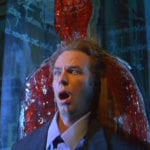 History
History  History
History  Health
Health 10 Everyday Activities That Secretly Alter Consciousness
 History
History Top 10 Historical Disasters Caused by Someone Calling in Sick
 Animals
Animals 10 New Shark Secrets That Recently Dropped
 Movies and TV
Movies and TV 10 Forgotten Realities of Early Live Television Broadcasts
 Technology
Technology 10 Stopgap Technologies That Became Industry Standards
 Weird Stuff
Weird Stuff 10 Wild Facts About Taxidermy That You Probably Didn’t Know
 Travel
Travel 10 Beautiful Travel Destinations (That Will Kill You)
 Miscellaneous
Miscellaneous 10 Modern Marriage Rituals Born from Corporate Branding
 Weird Stuff
Weird Stuff Ten Bizarre Visions of 2026 from Fiction
 History
History 10 “Modern” Problems with Surprising Historical Analogs
 Health
Health 10 Everyday Activities That Secretly Alter Consciousness
 History
History Top 10 Historical Disasters Caused by Someone Calling in Sick
Who's Behind Listverse?

Jamie Frater
Head Editor
Jamie founded Listverse due to an insatiable desire to share fascinating, obscure, and bizarre facts. He has been a guest speaker on numerous national radio and television stations and is a five time published author.
More About Us Animals
Animals 10 New Shark Secrets That Recently Dropped
 Movies and TV
Movies and TV 10 Forgotten Realities of Early Live Television Broadcasts
 Technology
Technology 10 Stopgap Technologies That Became Industry Standards
 Weird Stuff
Weird Stuff 10 Wild Facts About Taxidermy That You Probably Didn’t Know
 Travel
Travel 10 Beautiful Travel Destinations (That Will Kill You)
 Miscellaneous
Miscellaneous 10 Modern Marriage Rituals Born from Corporate Branding
 Weird Stuff
Weird Stuff Ten Bizarre Visions of 2026 from Fiction
Top 10 Commonly Misquoted Quotations
Misquotations are numerous, prevalent, and seemingly, inevitable. Hamlet’s “Alas, poor Yorick. I knew him, Horatio” (5.1.190-1) is frequently misquoted as “Alas, poor Yorick. I knew him well.” The same goes for Darth Vader’s iconic declaration in The Empire Strikes Back (1980), which is often misremembered as “Luke, I am your father” rather than “No, I am your father.”
The corruption and misattribution of quotations happen for a variety of reasons. Sometimes, as in the case of Vader’s revelation, it is to add context. In other cases, the original saying is clumsy or doesn’t translate neatly. And misattributions often happen because they seem right, despite not being accurate. Whatever the reason, here are ten quotations that are commonly misquoted or misattributed, or both.
Related: 10 Quotes From Experts Who Were Proved Wrong
10 “There’s a sucker born every minute.”
Most people believe that this phrase was uttered by P. T. Barnum, the 19th-century showman known for his museum of curiosities and hoaxes. However, there is no evidence that he ever spoke these words. Arthur H. Saxon, Barnum’s biographer, explains that “There’s no contemporary account of it.” The phrase has been attributed to both Adam Forepaugh and David Hannum, who said it in connection with Barnum, who was their competitor.
The phrase itself goes back further than that, though. The earliest known version comes from an article published in European Magazine in 1806: “It was the observation of one of the tribes of Levi, to whom some person had expressed his astonishment at his being able to sell his damaged and worthless commodities, ‘That there vash von fool born every minute.’” Barnum wasn’t even born until 1810, so there is no possible way he was involved with the coining of this phrase.[1]
9 “That’s one small step for man, one giant leap for mankind.”
As Neil Armstrong took his first step onto the surface of the moon in 1969, he famously declared, “That’s one small step for man, one giant leap for mankind.” Only, those weren’t his actual words. Armstrong has stated that he actually said “one small step for a man,” which makes much more sense semantically. In the famous but misquoted version of this phrase, “man” and “mankind” are synonymous. Adding “a” before “man” clarifies that it is the step of an individual.
In his official biography, First Man: The Life of Neil A. Armstrong (2005), written by James R. Hansen, Armstrong offers the possibility that the sound “didn’t get picked up by the voice mic.” He explains that if he was at fault for omitting it though, he hoped “history would grant me leeway for dropping the syllable and understand that it was certainly unintended.” NASA did indeed grant him leeway, transcribing the audio with the inclusion of the “a.”[2]
8 “The ends justify the means.”
Niccolò Machiavelli’s The Prince (1532) has long been misunderstood as a guidebook to being evil, with its main message being summed up neatly by the expression “the ends justify the means.” Anyone who has actually read this political text will know that these words never appear. While his very name has become synonymous with behavior that is “marked by cunning, duplicity, or bad faith,” Machiavelli did not actually recommend outright villainy.
The sense of this phrase is most closely reached when he advises the prince to “stick to the good if he can but know how to be bad when the occasion demands.” So, a more accurate summary of Machiavelli’s political philosophy would be “the ends sometimes justify the means.” The Roman poet Ovid is the more accurate originator of this quotation. In the second poem of his Heroides, he writes “Exitus acta probat,” which translates to “the outcome justifies the means.”[3]
7 “A journey of a thousand miles begins with a single step.”
These motivational words, which have been added to pictures of mountains and shared across the internet, are occasionally misattributed to Confucius. However, the quotation is actually credited to his contemporary, Lao Tzu. It comes from the Chinese religious and philosophical text Tao Te Ching, also known as Dao De Jing, from roughly 400 BC.
The saying in its current popular form is also not totally accurate. It actually reads, “the journey of a thousand li commenced with a single step.” Li is a traditional Chinese measurement of distance, which converts to roughly 360 miles. Unfortunately, 360 isn’t as nearly snappy as a thousand, of course, so the corruption is understandable.[4]
6 “Hell is just a frame of mind.”
If you plug this quotation into Google, multiple results will claim that it comes from Christopher Marlowe’s Doctor Faustus (c. 1592/3). But this exact phrase is not to be found within the pages of the play, although the sense of it is. Mephistophilis, the demon Faustus conjures up, utters a warning about the horrors of hell: “Hell hath no limits, nor is circumscribed / In one self-place; but where we are is hell; / And where hell is, there must we ever be” (5.120-2).
Mephistophilis essentially insists that hell is not a location, but a state of being, or to put it another way, a frame of mind. His speech has been twisted and shortened into the quotation that is now closely identified with the play. Mephistophilis’s original words are far more impactful, although they were not enough to dissuade Faustus from his treacherous path.[5]
5 “Well-behaved women seldom make history.”
This quotation is not only widely misattributed, but the original meaning has also been distorted. It is frequently tagged as being said by Marilyn Monroe, but it was actually penned by the academic Laurel Thatcher Ulrich. Much of Ulrich’s research is about the women who have been traditionally left out of the history books. This now-widespread saying comes from her 1976 paper “Vertuous Women Found: New England Ministerial Literature, 1668-1735.”
Out of context, the quotation is seen as an encouragement for women to rebel, but Ulrich’s original meaning was that well-behaved women should make history. In 2007 she released a book titled Well-Behaved Women Seldom Make History and commented that the slogan’s popularity offered “an opportunity to reach out to those who might not take a history course, and encourage them to ask new questions about the nature of history.”[6]
4 “Houston, we have a problem.”
Born from an onboard explosion during the Apollo 13 mission to the moon, this phrase has become shorthand for saying something has gone wrong. But it isn’t exactly what was said. In reality, Jack Swigert said, “Okay, Houston, we’ve had a problem here.” When prompted, Jim Lovell then repeated, “Uh, Houston, we’ve had a problem.” The more urgent and suspenseful “Houston, we have a problem” was popularized by the 1995 movie Apollo 13.
The Tom Hanks version has since overridden the original in our collective cultural conscience. William Broyles Jr., one of the movie’s screenwriters, explains that “The past perfect tense wasn’t as dramatic as “We have a problem”—which meant that the problem was happening right then and was continuing.” But this wasn’t the first time the words were changed. In 1983, NASA themselves used the misquoted version as the title for a radio program. It was also the title of a TV movie about the mission made by Universal Television in 1974.[7]
3 “The only two certainties in life are death and taxes.”
Various people are cited as originating this pithy phrase, most notably Mark Twain and Benjamin Franklin. In 1884, Mark Twain, who loved a witty remark, wrote in a letter that he “changed publishers once—and just as sure as death and taxes I never will again.” And Benjamin Franklin used the quip even earlier, employing it in a letter written in 1789: “in this world nothing can be said to be certain, except death and taxes.” Earlier still, Daniel Defoe used it in The Political History of the Devil (1726): “things as certain as death and taxes, can be more firmly believed.”
But none of these men actually came up with the phrase, despite being the most widely cited examples. The earliest known usage of the term comes from Christopher Bullock’s play The Cobbler of Preston, first performed in 1716. The drunken cobbler Toby Guzzle says, “You lye, you are not sure; for I say, Woman, ’tis impossible to be sure of any thing but Death and Taxes.”[8]
2 “I disapprove of what you say, but I will defend to the death your right to say it.”
Voltaire made this statement about the importance of free speech, right? Wrong. The French Enlightenment writer was a proponent of free speech, but he never wrote or said this now-famous phrase. It was actually penned by Evelyn Beatrice Hall, writing under the pseudonym S. G. Tallentyre.
In her biography of Voltaire, The Friends of Voltaire (1906), she wrote the sentence to summarize his opinion. She even included “was his attitude now” at the end of the sentence. However, this clarifying segment is commonly missed out, thereby leading to the misunderstanding that Voltaire himself wrote it. Despite being a prolific and influential writer, he wasn’t actually the originator of his most renowned pronouncement.[9]
1 “Don’t fire till you see the whites of their eyes.”
This is one of the most famous quotations from the American Revolutionary War. Johnny Horton’s 1959 song “The Battle of New Orleans” attributes the command to Andrew Jackson during the War of 1812 instead: “Old Hickory said, ‘We could take ’em by surprise if we didn’t fire our muskets ’til we looked ’em in the eye’.” However, it is more commonly thought that the original words were spoken by Colonel Israel Putnam or Colonel William Prescott at the Battle of Bunker Hill.
Historians are now not certain that the command was uttered at all during the battle. Regardless of whether it was or wasn’t, it was not an American colonel who originally coined it. Predating the battle, there is evidence to suggest that Frederick the Great ordered his Prussian soldiers to withhold from shooting until the enemies’ eyes could be seen. The command was also previously used by British officers in the Royal Navy. If Putnam or Prescott did give this famous command, then it was likely because they had previous knowledge of it.[10]








